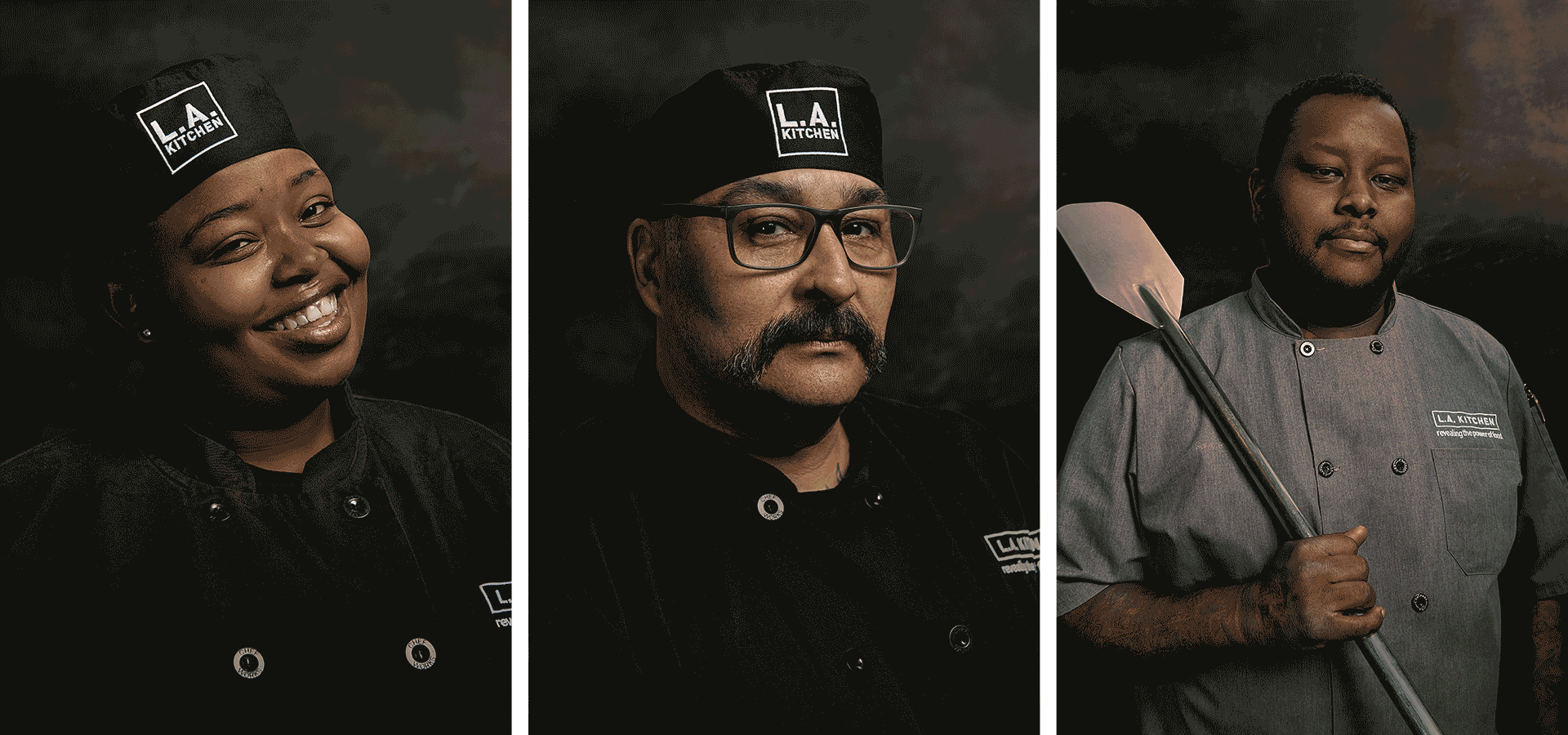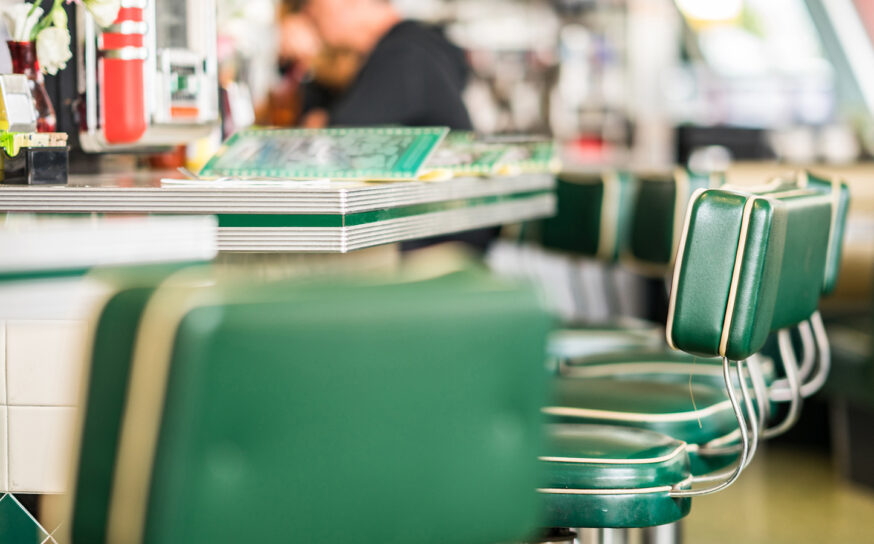From Knife Skills to Life Skills, L.A. Kitchen Serves Up Knowledge and Hope
Incarcerated, homeless or aged out of the foster care system, these aspiring chefs prep for a second act.
-
CategoryFarm + Table, Giving Back, Makers + Entrepreneurs
-
Written byPeggy Abraham
-
Photographed byKremer Johnson
Not many people would think of going to a kitchen to heal, but one man’s amazing mission has turned cooking and serving others into a tried-and-true therapy. Visionary Robert Egger founded L.A. Kitchen in 2015 with a simple, yet challenging and powerful goal: Neither food nor people should ever go to waste. This 20,000-square-foot facility just north of downtown Los Angeles accomplishes that mission and then some. From turning reclaimed food into meals for social service agencies to running a for-profit business, which uses “imperfect” food to make healthy products for sale, this bustling operation is transforming the concept of recycling. But there’s no doubt it’s the company’s culinary job training program where the magic begins.
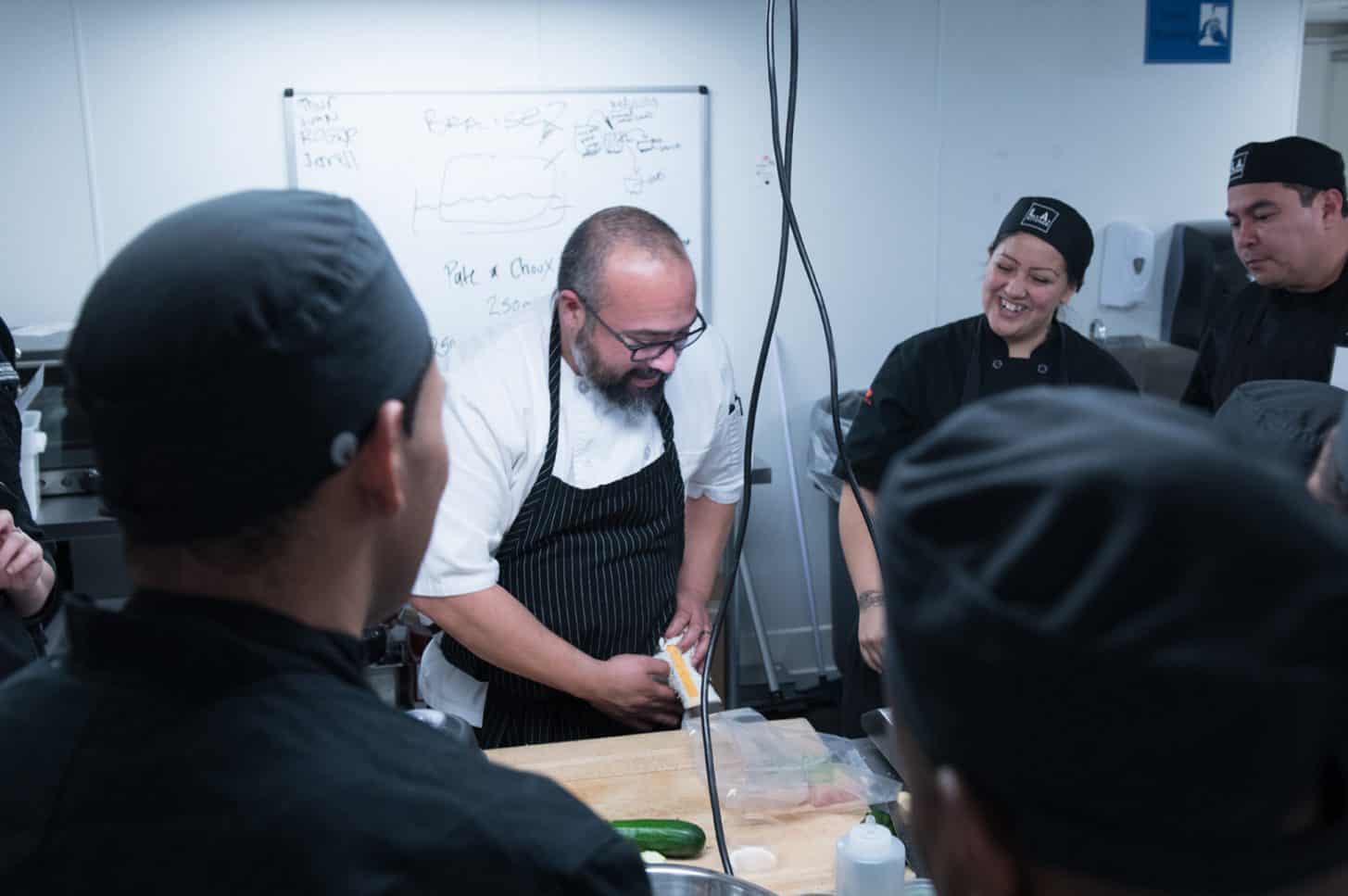
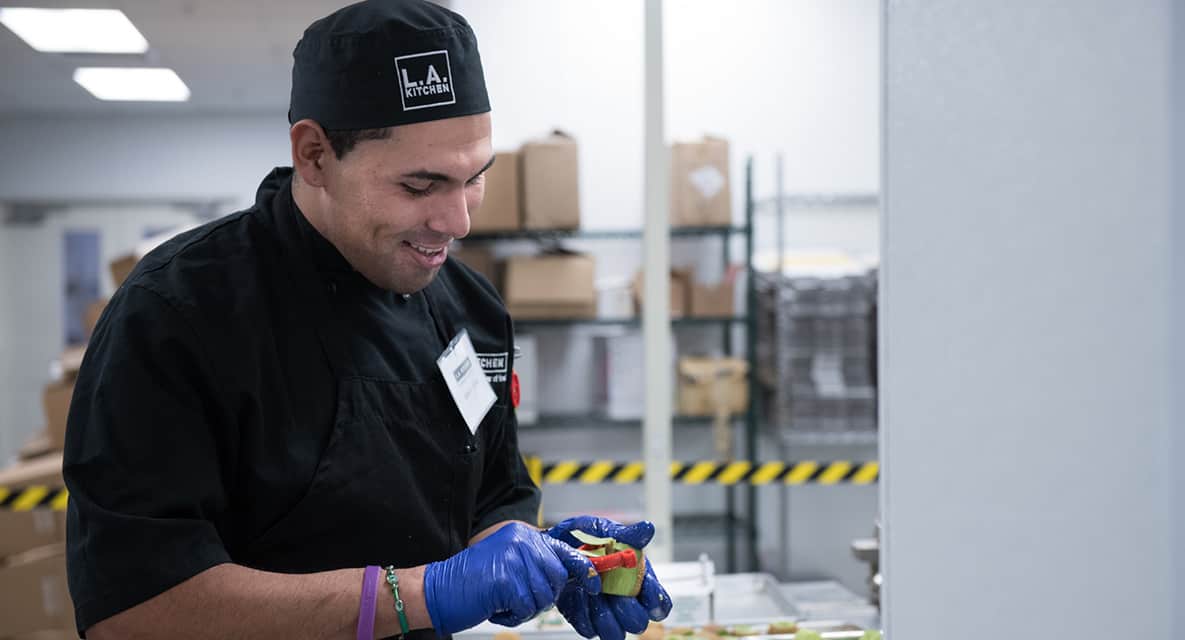
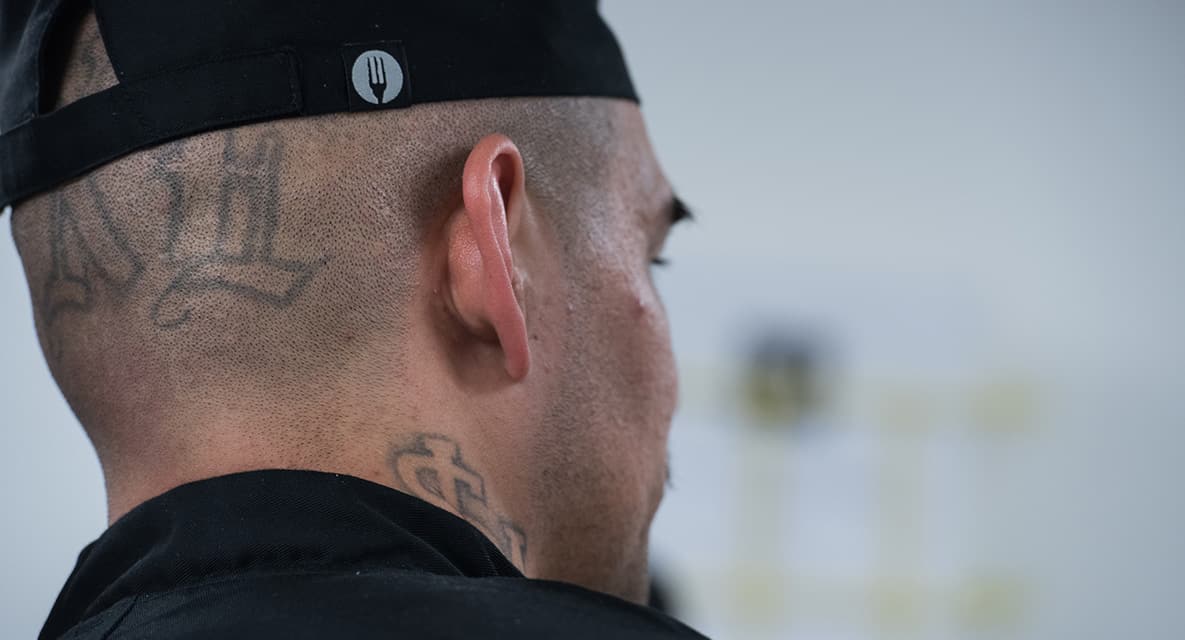
Called Empower L.A., this unique school admits 22 new students, every 14 weeks. These are not your typical applicants, however. All of the participants have either been incarcerated, homeless or aged out of foster care. Robert explains, “At L.A. Kitchen, we take the things most view as part of the problem and try to reveal that they can be part of the solution, if viewed as assets.” Indeed, this is a place of second chances where people come first.
Meet a couple of the students:
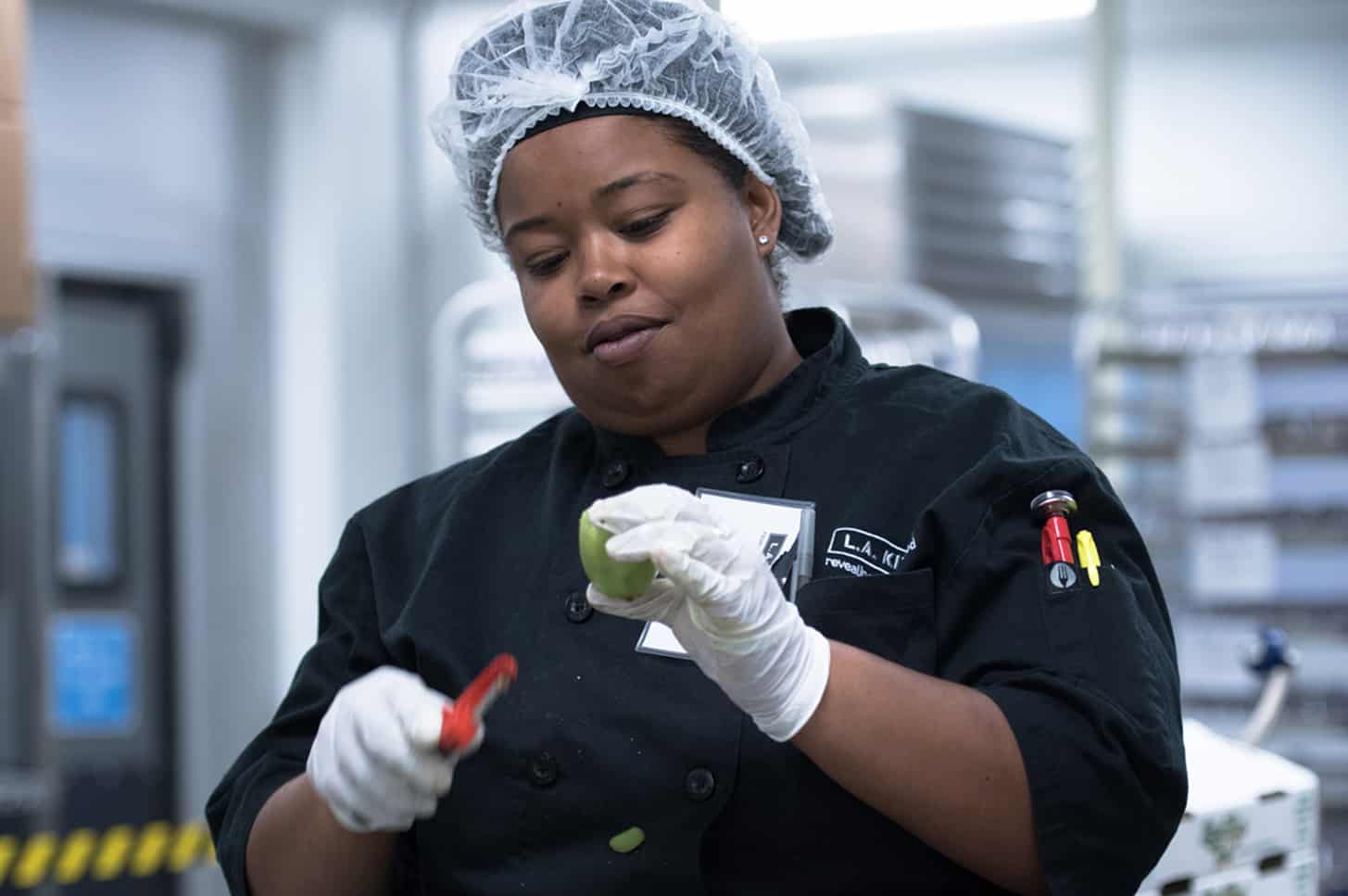
ALISHA
You might expect to encounter bubbly 28-year-old Alisha Larsuel at a food festival or music concert, but you would not for a minute imagine she’d spent a year and a half in jail for assault with a deadly weapon. Cooking and elderly care have been part of Alisha’s life almost as long as she can remember—making meals for and taking care of her great grandmother at the age of 12. “I started cooking off of being emotional. Whenever I would get sad or kind of upset, I would cook,” she says.
When it came time to find a job, Alisha naturally gravitated to elder care, but when the results of her fingerprinting came back, the agency she worked for discovered she had a felony and had to let her go. Regardless of how many people in Alisha’s care vouched for her, it was company policy, and she was out on the street. She describes her criminal background as a “wall” that had always stood in her way. “You get down going from job to job. Everybody tells you you’re great, you’re so joyful … but your background. I’m like, ‘Can you just eliminate my background and let me work?’”

That’s exactly what they do at L.A. Kitchen. Alisha says they accept you here regardless of your background. It’s a place where you can tear down that wall. Finding this sanctuary started when she joined an outreach program called Friends Outside. One day she cooked a peach cobbler for the group and the whole office started fighting over it. They told her, “You need to go to L.A. Kitchen.” Now she is learning something new every day and after only three weeks, describes her class as a “family” where everyone has each other’s back. When asked about a fun, interesting thing she’s already learned to cook, Alisha’s face lights up and without hesitation, she answers, “savory pate a choux.” It’s yet another surprise from this enthusiastic student. “I always had it where it’s sweet and filled with something like ice cream. Now we’re making them with garlic herb butter!” For those of us non-chefs, pate a choux is a delicate French pastry.
So where does this budding chef see herself in five years? She wants to eventually start her own catering business but says she’ll always be involved in elder care. She’d like to run something like “Meals on Wheels,” but where the food is personalized to reflect different ethnicities. She’s thinking of healthy versions of dishes like collard greens and menudo. In her caring way, Alisha explains, “When people get older, they revert to being a child and want to eat something they can remember.”
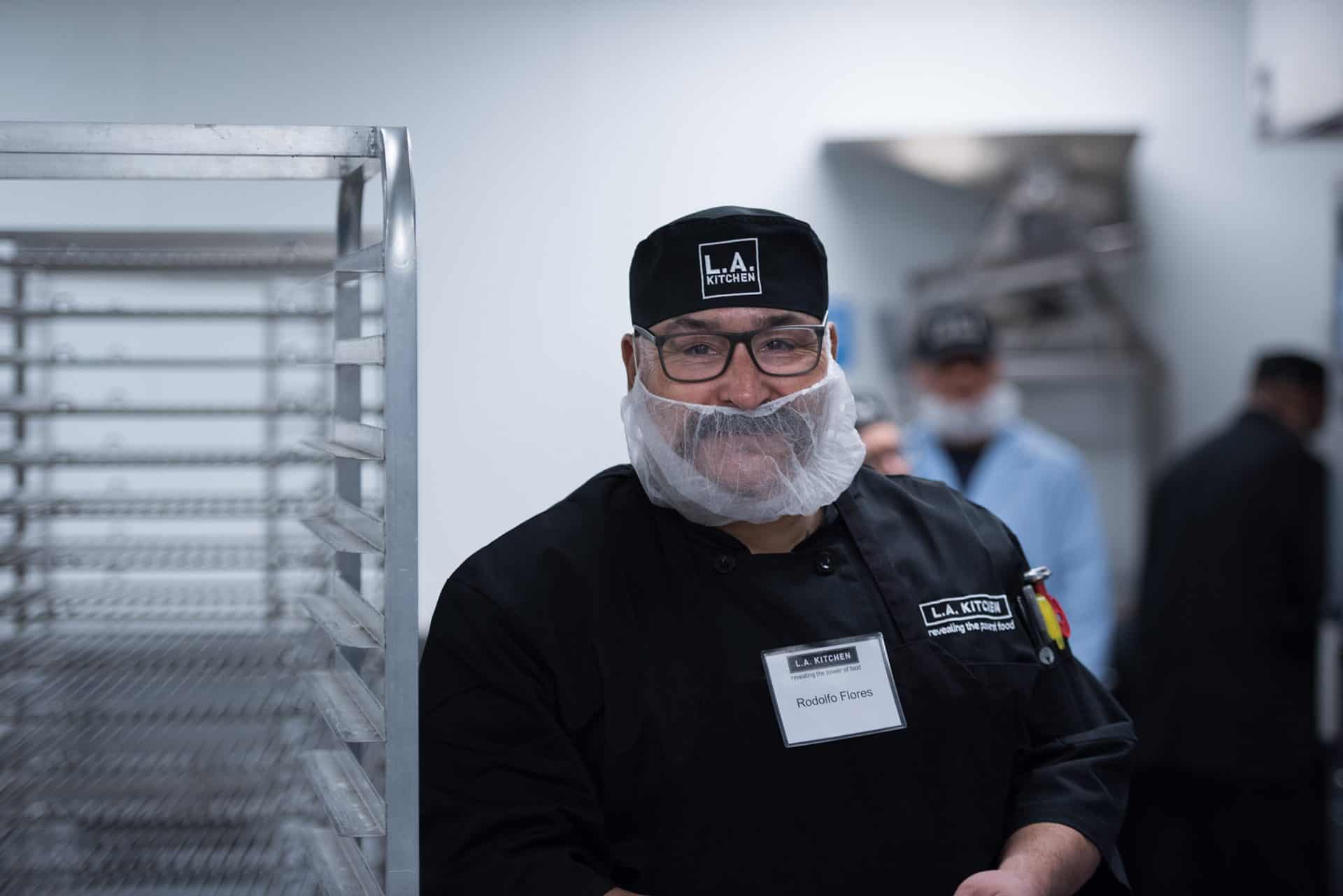
RODOLFO
At first glance, you don’t see the ankle monitoring bracelet attached to Rodolfo Flores’ leg. You see an eager, grateful 46-year-old student who is right where he is supposed to be. “A year before I got here, it was already planned with God,” he says. Like so many people here, Rodolfo speaks of L.A. Kitchen in spiritual terms. “I think this place is holy to me. There’s no chance to mess up because everybody is so nice. You can’t make wrong decisions. You get so excited that you want to make them proud of you.”
Despite the fact that he describes himself as a “shy person,” Rodolfo seems happy to sing the praises of the Kitchen as well as open up about his past. It’s a checkered one to be sure—one that started out so promising. He always loved sports and was recruited to play football at Humboldt State. There he was introduced to painting, photography and sculpture and eventually ended up with a studio art major.
Armed with a skill, Rodolfo taught art to kids of all ages—from kindergarten to high school. But his demons took over and soon he was on the path to not one, but four separate prison terms, including a stint in Folsom. Fast forward 15 years, and Rodolfo agrees to enter a program called HealthRIGHT 360, mostly he says, just to get out of jail early.

“I wanted to give myself a chance this time to get my head right and find a career. Because when you get out of prison, they give you $200 and that’s it. No job, no help, nothing.”
Rodolfo felt comfortable in the culinary world. While serving his various sentences, he worked at a fire camp kitchen, was a dishwasher and a prep cook. Now Rodolfo’s not only learning new skills, but he’s back to teaching again—teaching the people who come here to volunteer. It reminds him of the good parts of his past.
“They recycle everything here. They recycle people like me that done things in the past that I shouldn’t have done, bad decisions, but now it’s a new me.” It makes Rodolfo especially proud to know that he is preparing food for others who really need it. He’s been in that place where he was hungry but would rather spend his money on drugs or alcohol than eat. Now he says, “A van comes along and gives them food. And I was part of that—cutting those vegetables.”
Rodolfo’s dream job would be right here at L.A. Kitchen. He softly grins when he explains, “What’s better than staying here and working here?”
It’s a dream you feel confident will come true.
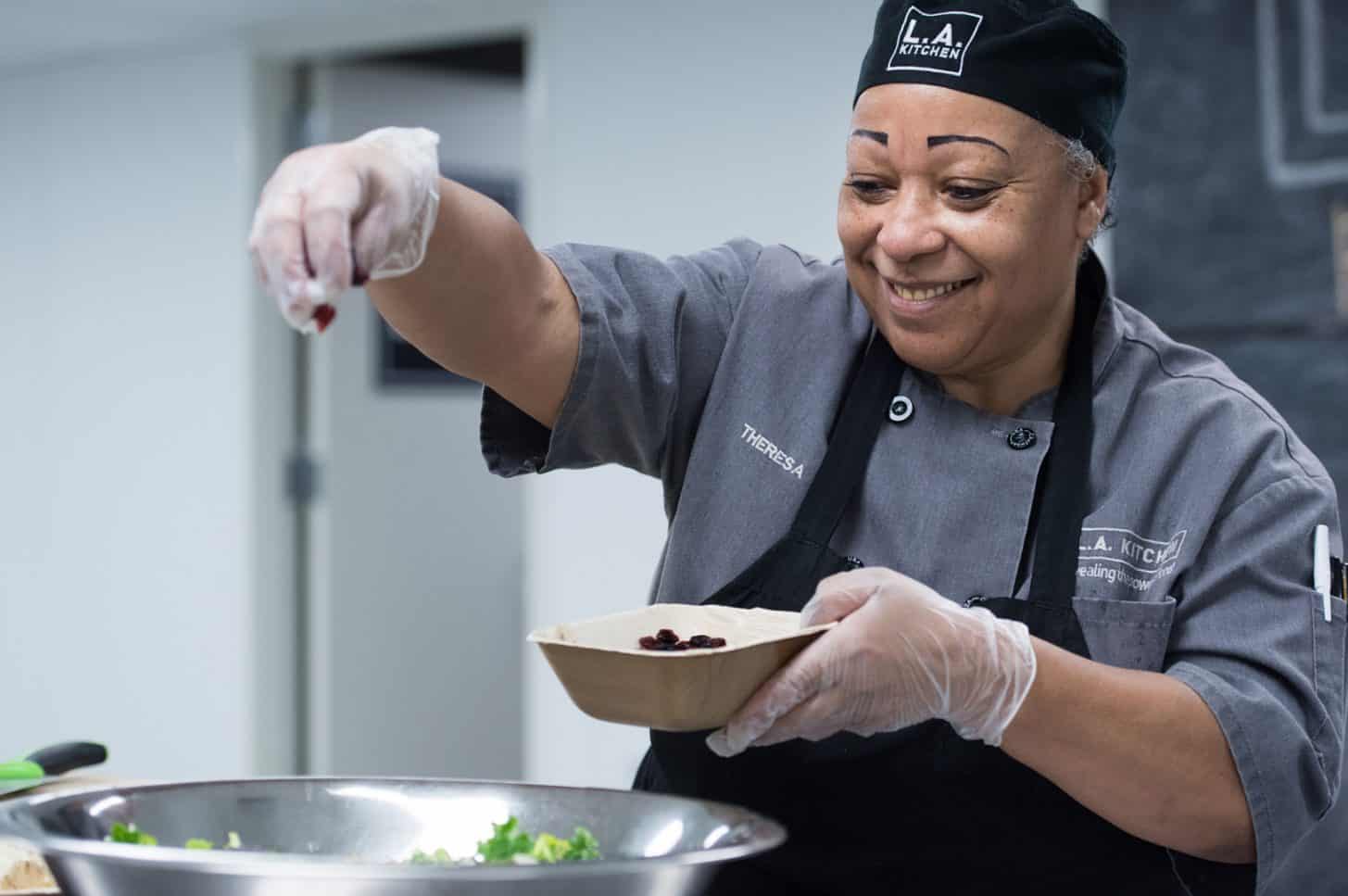
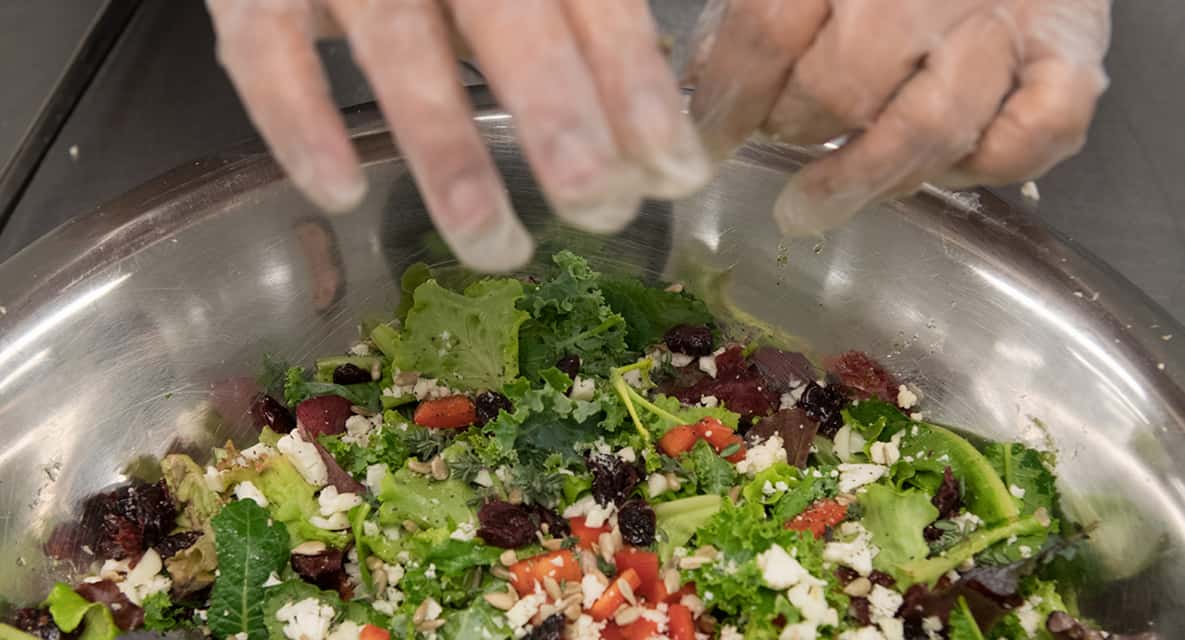
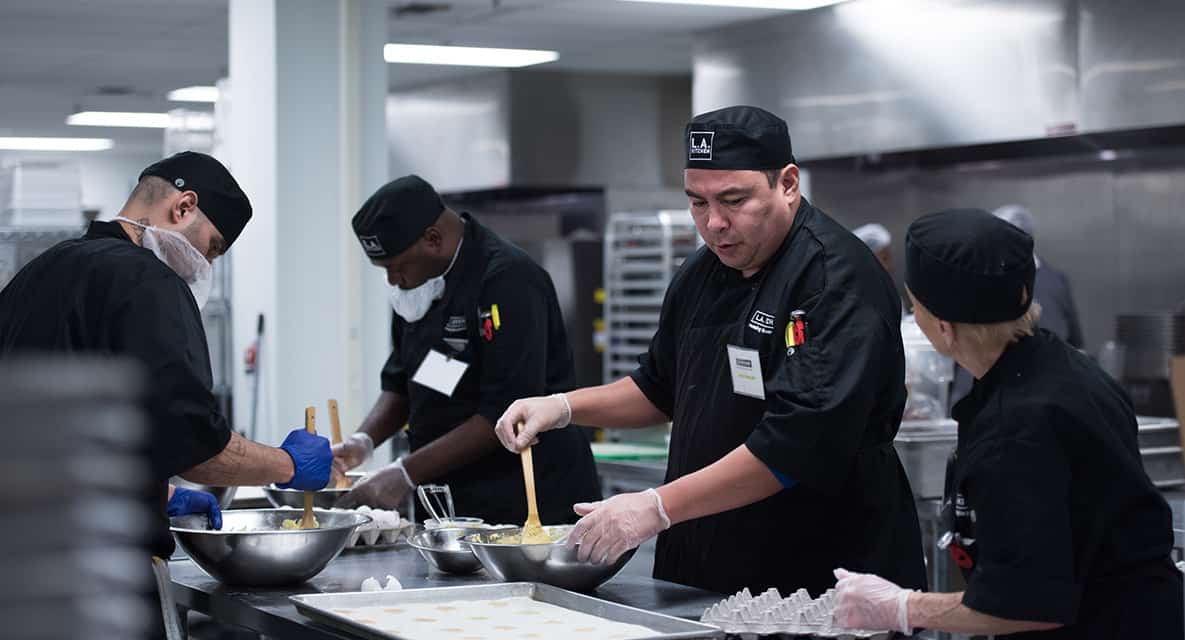
BEYOND THE KITCHEN
Chris Neely just graduated from Empower L.A. last October and already this eager young man, who spent four years in prison, has a steady job with Strong Food, the for-profit arm of this inspiring place. The most striking thing about his world now is the feeling of belonging, of being around people who care. It’s not something the 32-year-old had ever experienced before. He says after being incarcerated, you expect everyone to look at you differently, not to trust you. But here he is treated like family, like someone’s son. He attributes the inclusive atmosphere to Robert, the man behind the Kitchen and its methods.
“He [Robert] greets you in the morning. He handshakes, hugs, asks how you are doing, how’s your family. It was kind of weird to me. I’m not used to no one asking me how’s my day going.”
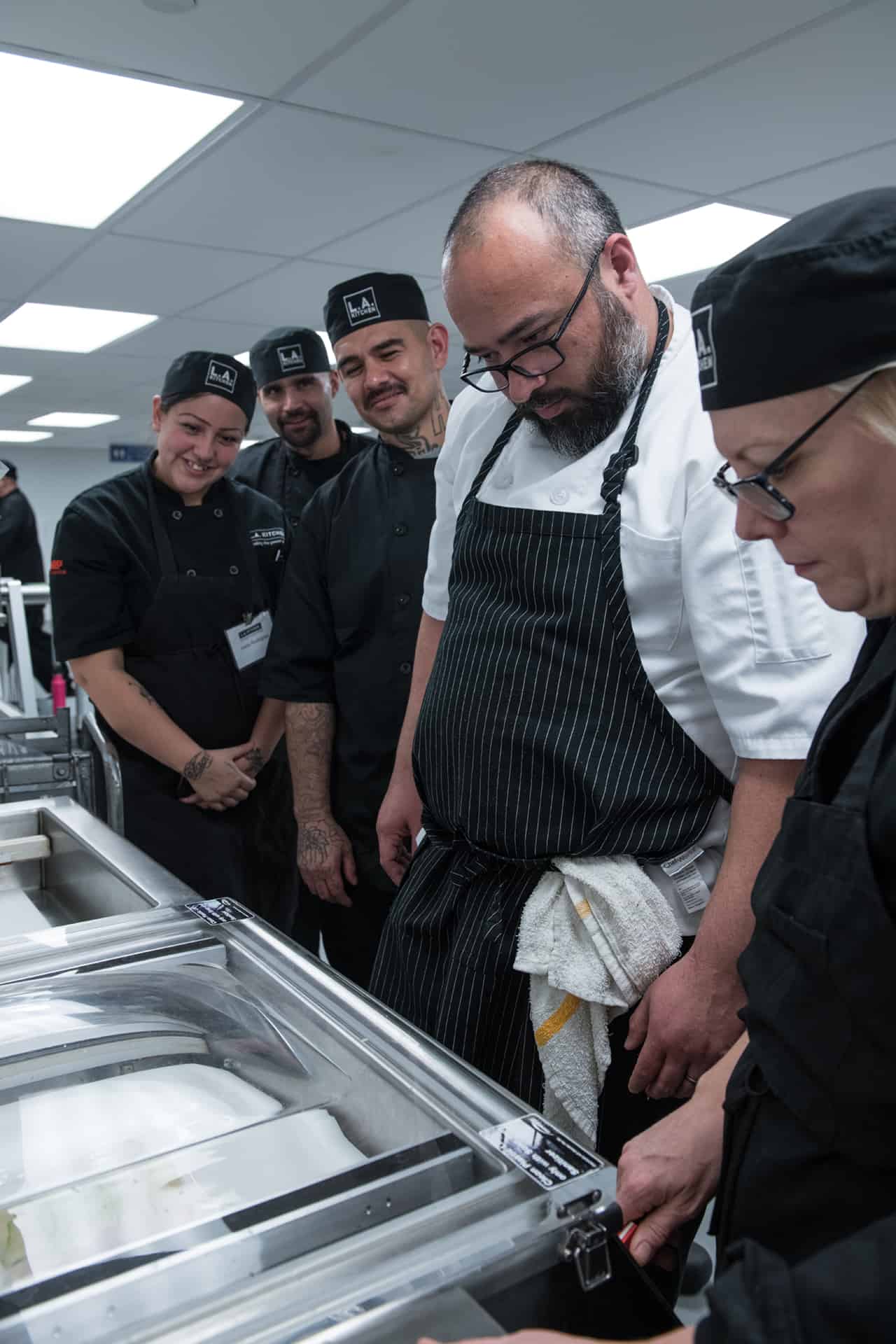
In addition to the culinary classes, the program offers one-on-one counseling, an important component in the healing process, according to Chris. “It feels good to have someone to talk to that you may not have at home. Just to tell them ‘Hey, this is what’s going on with me.’ And they listen to you. They don’t make fun of you. They even go the extra mile to try and give you a solution to how to fix the problem.”
Chris says it’s scary to consider where he would be now if not for the Kitchen. He guesses that he’d be on the streets, back in the penitentiary or dead. “They saved my life. They basically treated me like a newborn baby. Re-raised me. Reformed me to talk better, to perform better and to not be scared to go for your dream and go for it nonstop.”
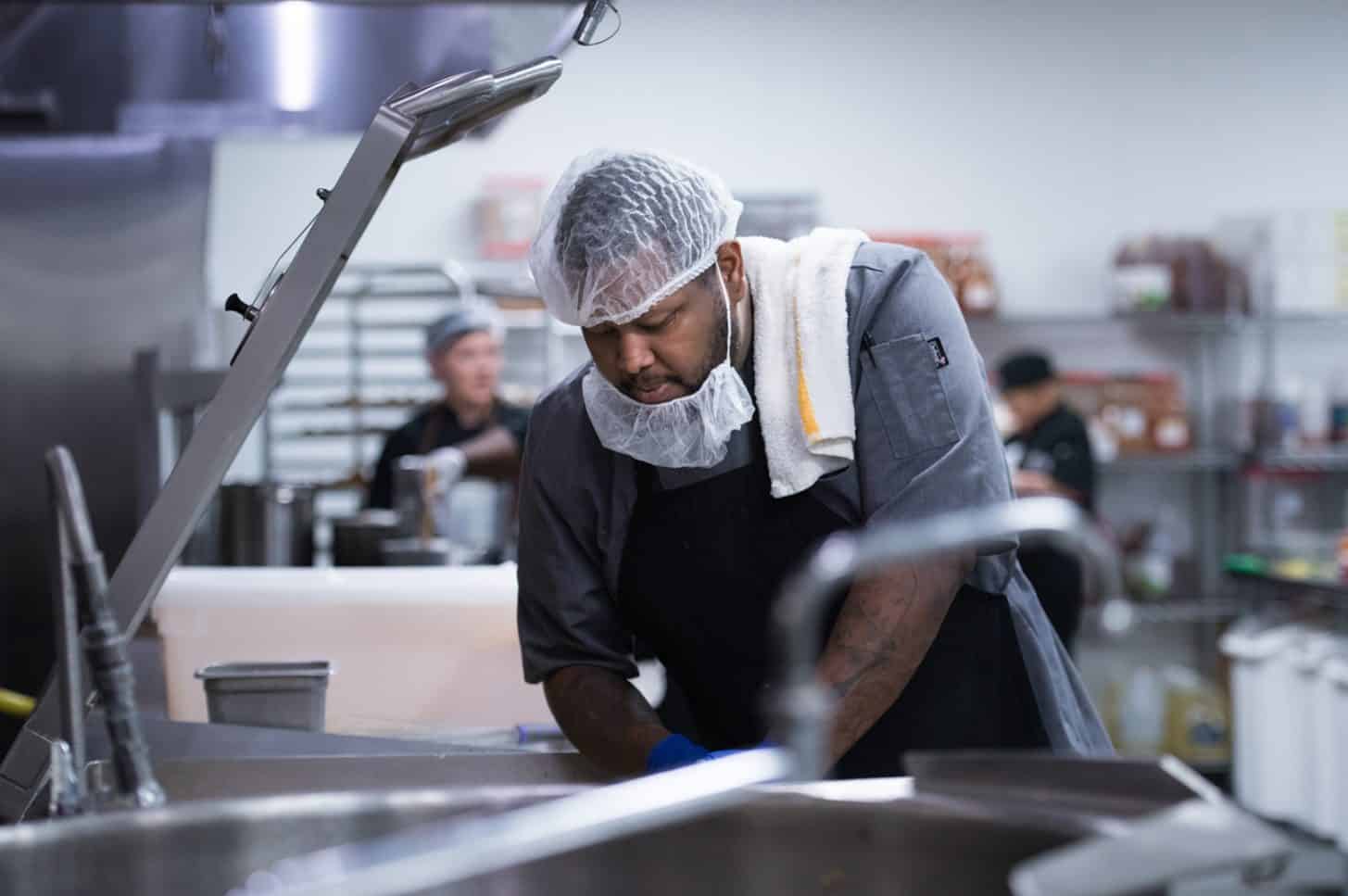
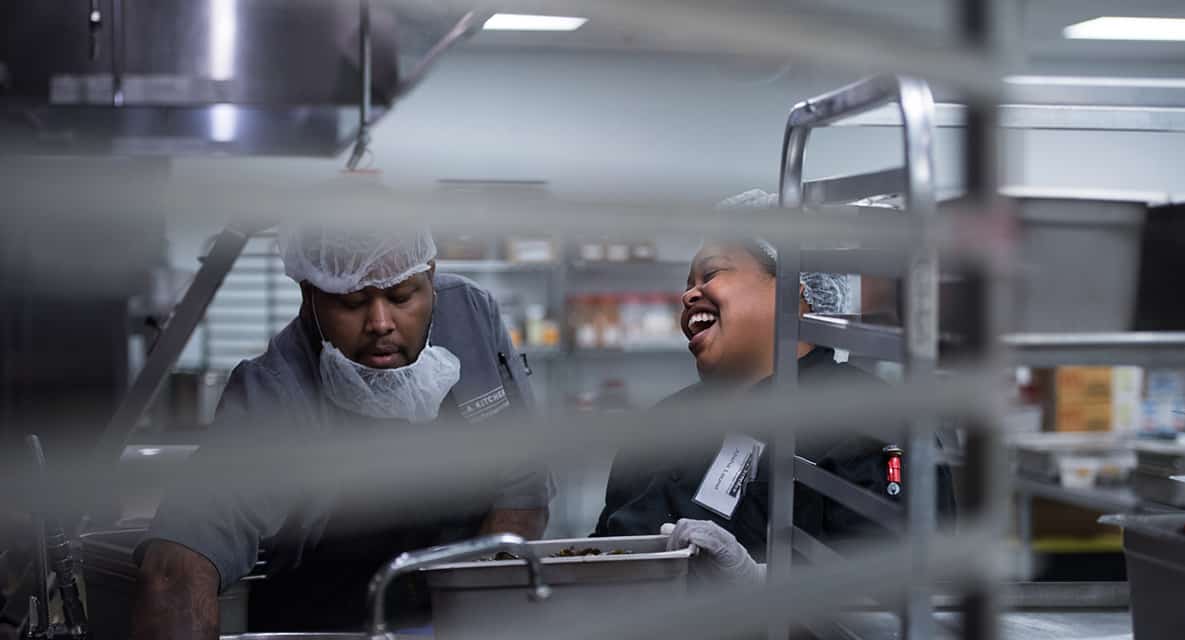
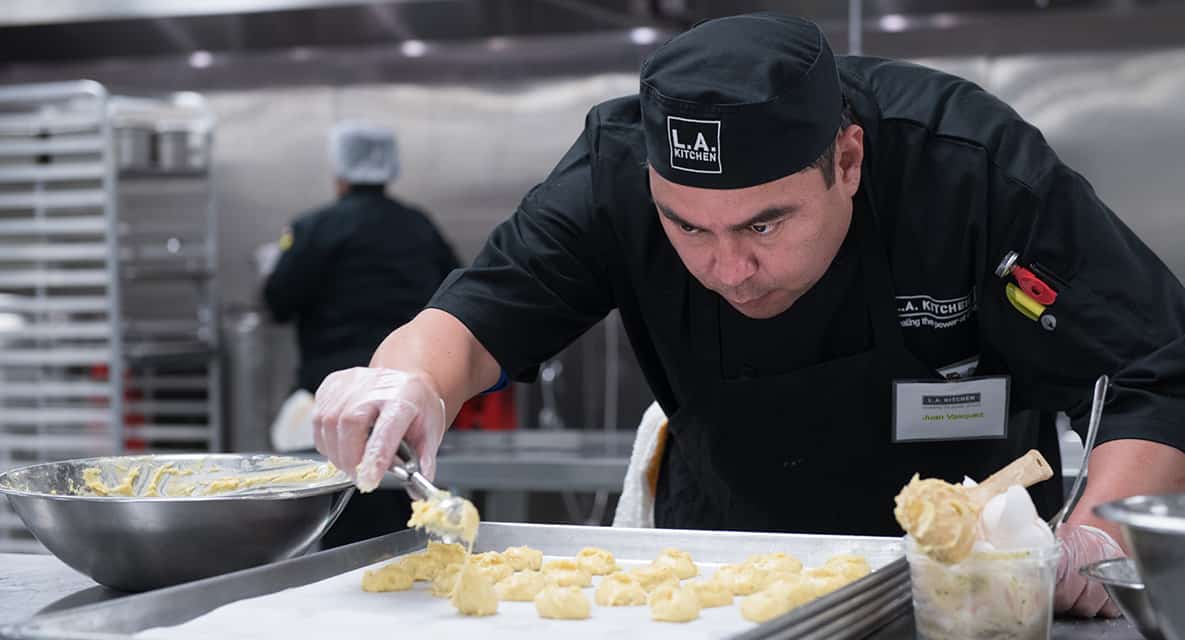
These are the stories and words that bring a smile to Robert’s face—to know that his vision is working and the lessons he teaches will carry on into the future. Yet he remains modest despite all the hope he has given to so many people, saying, “This isn’t a miracle program. We just celebrate the small steps and the waves that are created by the everyday ripples of showing up on time, working hard and staying focused.”
It’s clear the recipients of this opportunity and Robert’s respect and encouragement feel very blessed to be here. Rodolfo expresses it so beautifully when he explains, “Every day we have to say how we feel. I feel excited, almost butterflies—like I’m in love. But I know what it is. I’m in love with myself again because I can do this.”
5 Old-School California Eateries to Visit Now
Bring your curiosity and your appetite.
Monday Moods: “June Swoon”
Your musical pairing for that summertime sadness.
A Flea Market Find Uncovers the Destruction of the 1906 San Francisco Earthquake
The footage remained hidden for a century.
Get the Latest Stories




